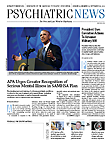Though previous research has shown some psychiatric populations to be at risk for disadvantages involving fertility, such risks in individuals with bipolar disorder (BD)—and those genetically predisposed to the illness—are less clear. Researchers at Yale University studied this issue by evaluating key social factors that influence the probability of reproducing in individuals who are genetically at increased risk for bipolar disorder.
“Traits like sociability and optimism, as well as intelligence, are factors that drive mate selection in human populations,” said senior author Tyrone Cannon, Ph.D., a professor of psychology and psychiatry, in an interview with Psychiatric News. Previous findings, he explained, have demonstrated that patients with BD have reduced rates of fertility compared with the general population, but nonaffected siblings of individuals with BD have increased fecundity—leading scientists to speculate that genes associated with BD may, in part, have some reproductive advantages in nonaffected individuals who are at greater liability for developing BD, unlike those who possess genes associated with schizophrenia.
“Despite being substantially heritable, bipolar disorder appears to be persisting in human populations at a stable rate of about 1 percent,” said Cannon. “In this study, we sought to test a theory of the maintenance of genes promoting bipolar disorder that may be associated with higher levels of certain traits—sociability and verbal ability—that in turn are associated with a higher probability of reproductive success.”
Using the Swedish Twin Registry to identify study participants, Cannon and colleagues evaluated temperament and neurocognition—traits important in selecting a mate—in twin pairs who were discordant for BD or schizophrenia, and twin pairs who did not have a mental illness. Neurocognition was assessed by a neuropsychological test battery, and temperament was measured by a series of questionnaires, including the Zuckerman Sensation-Seeking Scale and the Barratt Impulsivity Scale.
Results showed that nonaffected siblings in the BD twin pair were more likely to score higher on “positivity” temperament scales—characterized by social ease and assertiveness—compared with control subjects and the twin who had BD, with the latter scoring high on the “negativity” scale. As it relates to neurocognitive abilities, nonaffected BD siblings showed superior performance compared with controls on tests of verbal learning and fluency, while siblings with BD showed performance decrements.
Twin pairs genetically at high risk for schizophrenia, regardless of whether one or both had a diagnosis of schizophrenia, both showed attenuated impairments in positivity and in overall neurocognitive functioning.
“To our knowledge,” the researchers noted, “this is the first systematic study to indicate a possible familial compensatory advantage to bipolar illness in discordant twin pairs.” They suggested that enhanced temperament and neurocognitive benefits observed in nonaffected twins at risk for bipolar disorder could provide an explanation for the genetic persistence of this illness.
Although Cannon viewed the recent findings as a success, he told Psychiatric News that more research must be done, including the study of a larger sample group to determine whether the enhanced temperament and cognition profiles observed in the study are specific to first-degree relatives of bipolar patients who are prone to symptoms of the mood disorder.
The study, published August 15 AJP in Advance, was funded by the National Institute of Health and the National Science Foundation. ■
An abstract of “Enhanced Neurocognitive Functioning and Positive Temperament in Twins Discordant for Bipolar Disorder” can be accessed
here.

